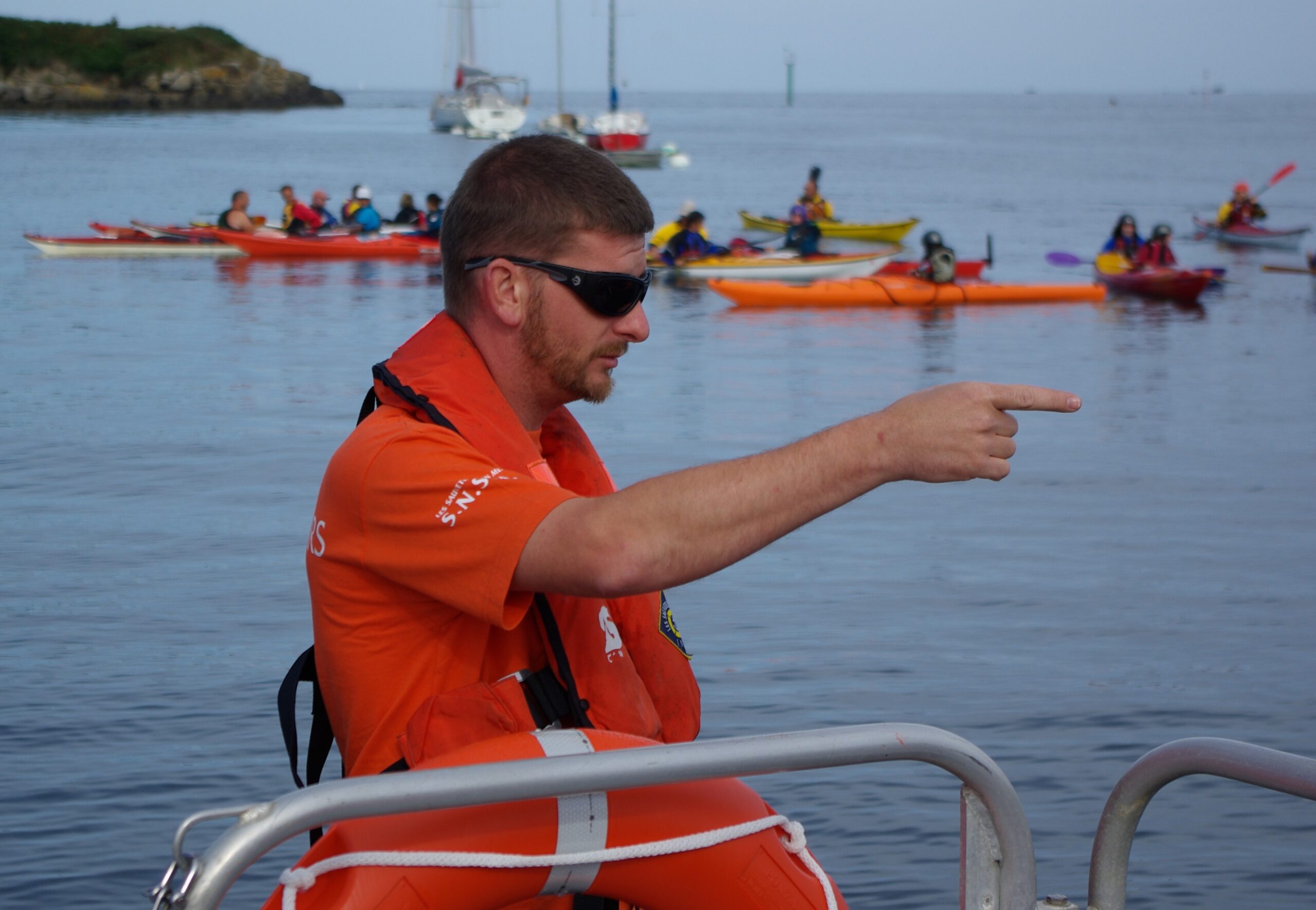
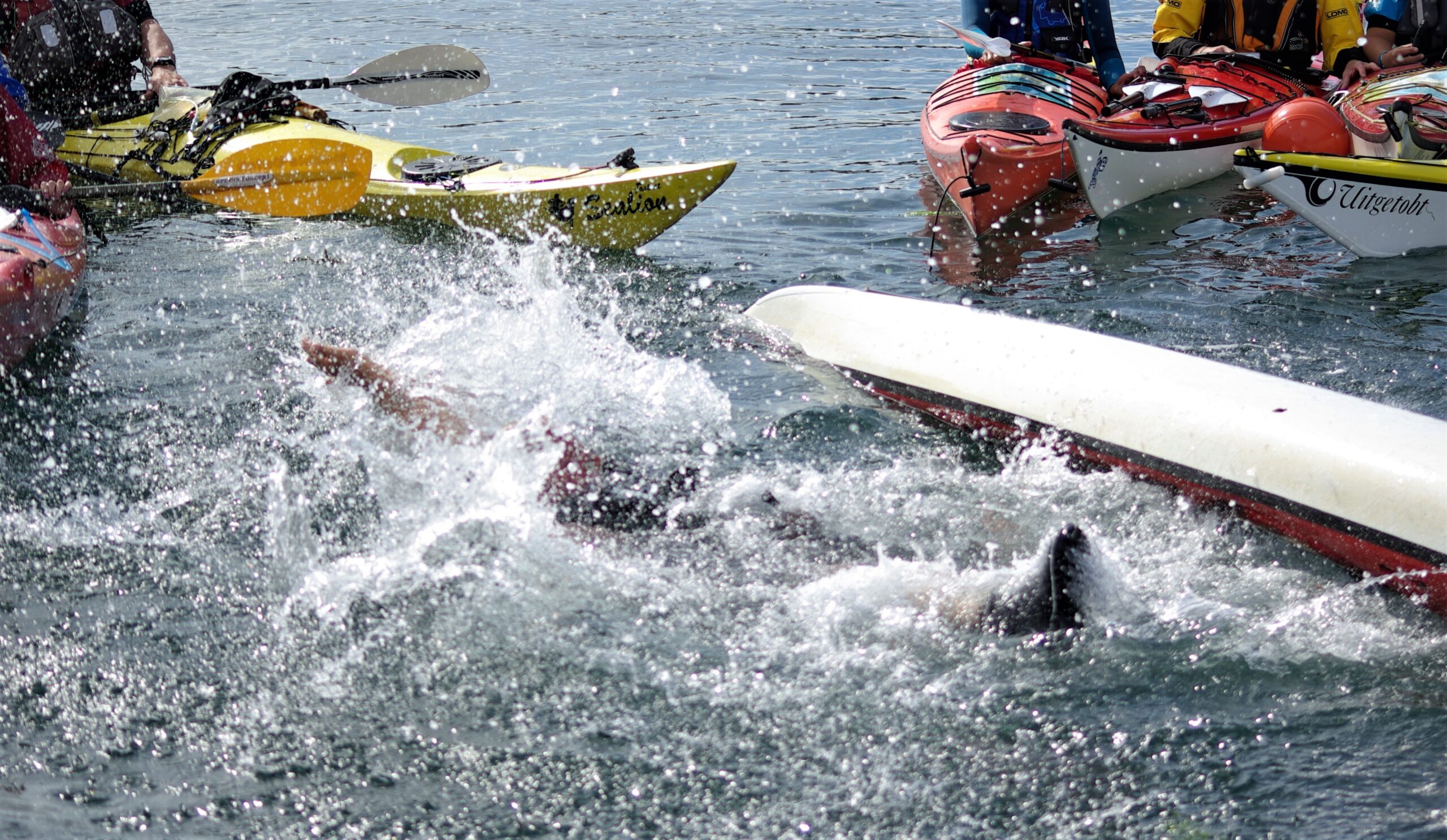
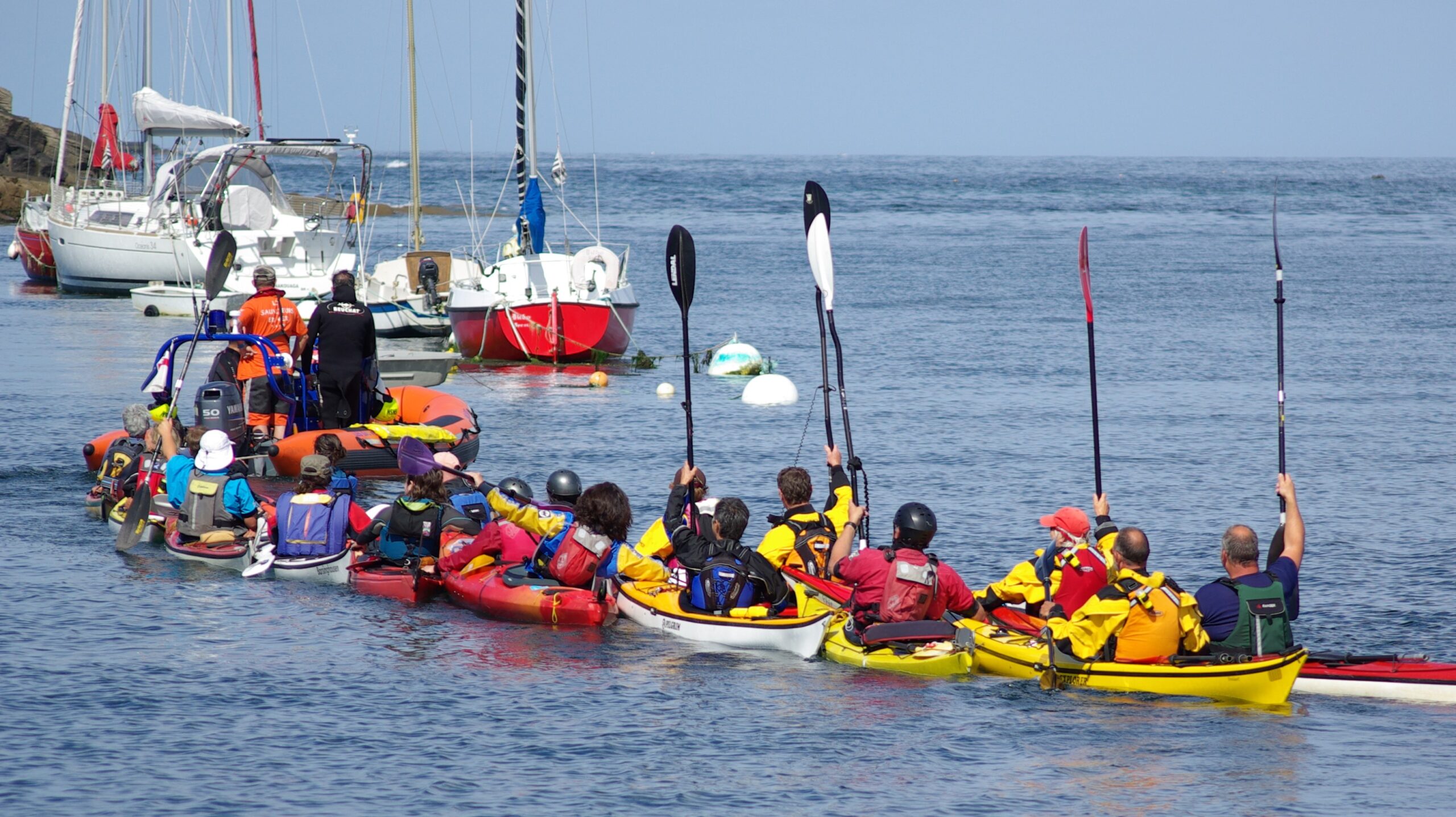
the three elements of effective leadership
Reality check
Leadership isn’t for everyone. If think you want to become a sea kayak leader, I would suggest that you ask yourself one question – why? Take a reality check – this is a professional qualification that will take time, cost money and change your attitude to recreational paddling forever. So be honest with yourself. Do you currently go paddling to escape from the endless demands of managing people and if so, are you sure you want to surrender this stress-free part of your life?
Acknowledge the responsibilities and high expectations that will be placed upon your shoulders. Ask some experienced leaders for their views and observe them in action – can you see yourself in that role? And remember that if you want to benchmark your personal paddling capabilities, you can do so without the burden of leadership. The Personal Performance Awards are a fantastic way to do this with far less stress, much less cost, no prerequisites and absolutely no additional future responsibility.
I genuinely enjoy the role and responsibility of being a sea kayak leader, supporting and challenging fellow paddlers while keeping them safe and happy. But it comes with a price tag – I’m far less spontaneous than I used to be and wouldn’t dream of leaving the shore without all the safety kit I habitually carry wherever I go, even for just a couple of hours. A full-time obsessive attention to risk assessment is one of the many continuous “apps” running in the background of my mind and I’m watchful of everyone, even paddlers far more skilled than me. It’s not happy-go-lucky anymore – quite the opposite!
If you read on, you’re obviously serious and committed to becoming a sea kayak leader. So let’s get to the nitty-gritty.
Personal skills for leadership
Okay, now stop for a moment and think hard. Have you already got the appropriate level of personal paddling skills to become a leader at your chosen level? You really do need to be properly prepared – leadership training courses are focused on managing a group of paddlers. These courses are not designed to teach you essential personal paddling skills. You should already be adept at controlling your kayak, able to roll, self-rescue and be totally autonomous. You also need to be physically fit enough for the job – expect to paddle faster and further as a leader. If you’re not 100% sure of your personal capabilities at the top end of the remit you should hold off from booking any leadership courses until you are. If you need an unbiased opinion of your state of readiness, book a day with me and we’ll find out together.
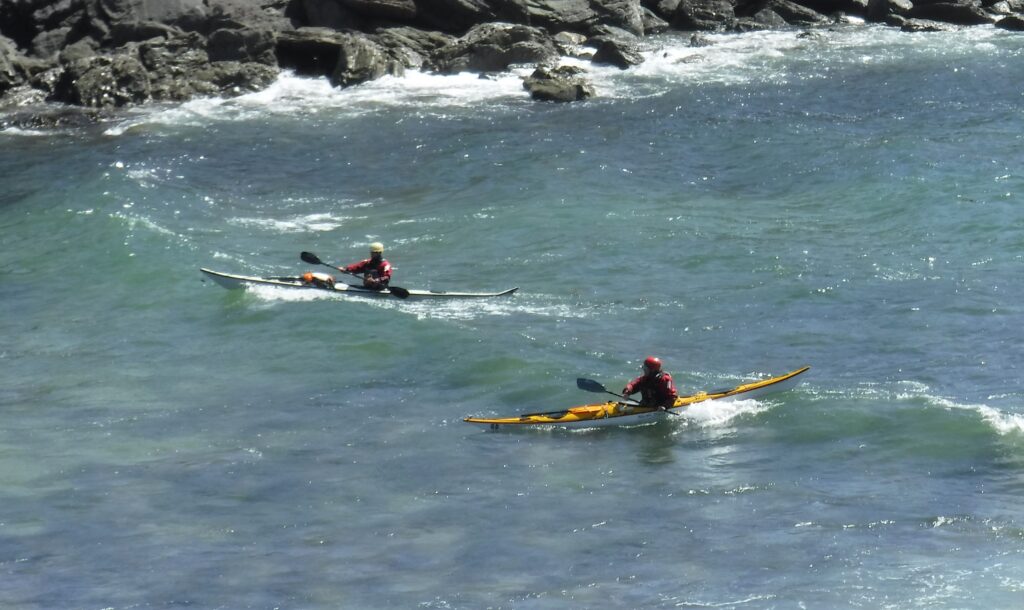
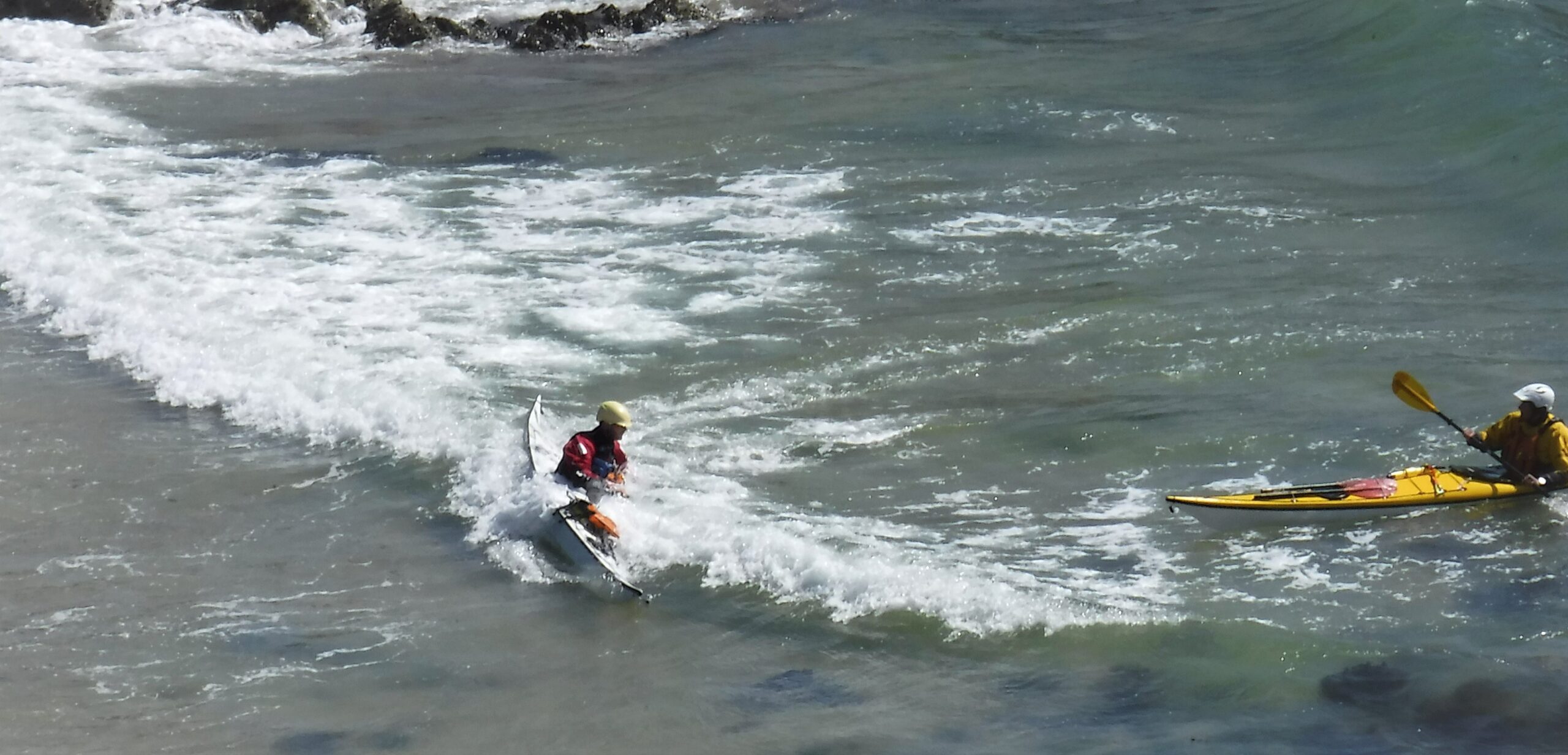
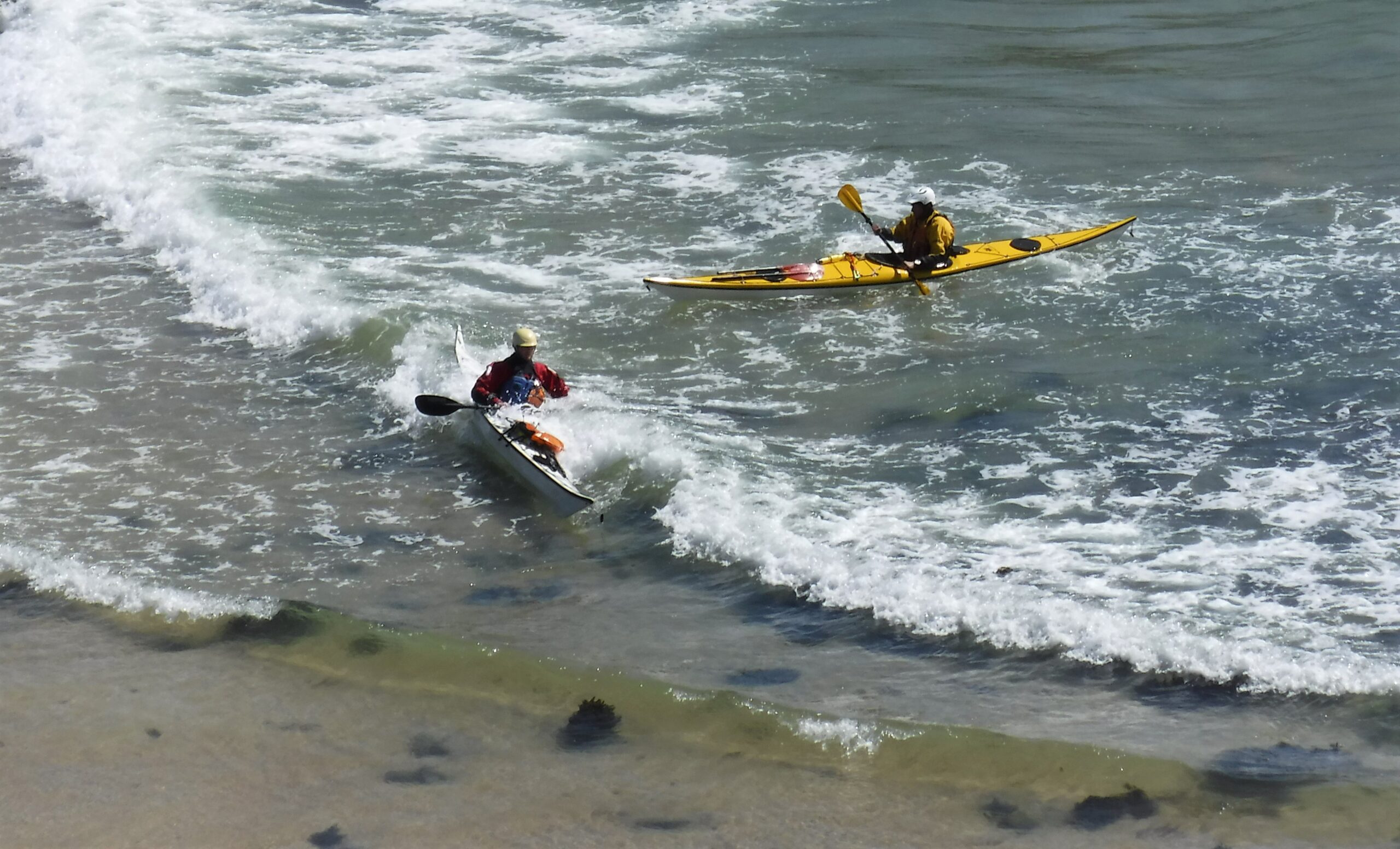
Fitness for leadership
Many aspirant leaders under-estimate how fit they will need to be. But just take some time to think about the extra work you’ll be putting in, compared to the other group members.
You’ll be carrying more kit
In my experience, somewhere between 10-15kg of extra kit. You’re going to carry it from the car to the beach and then it’s all going to disappear into your kayak as if by magic. At the end of the day you’ll be unpacking it again, before lugging it uphill to your vehicle! Efficiency is key so find an easy way of carrying it, develop a rapid packing system, refine it and then stick to your routine. My friends used to laugh at the little bits of tape stuck next to my hatches with lists of items stored inside. Nowadays the tape has gone but it’s still visible in my head and little has changed in how I pack each of my kayaks – it’s become almost automatic.
Your kayak will be heavy
You’ve made your kayak 50% heavier, so it’s going to be harder to move it around. It might sometimes feel like it’s stuck in treacle and if you expect it to dance around with minimal effort you’re in for a bit of a shock. Learn to paddle smarter and more efficiently to mitigate the weight effect. Take advantage of every opportunity that nature offers. Be aware that this is going to put more strain on your body so you may need to build some additional strength.
From right now, start adding kit into your kayak (bit by bit) and build up gently until you are carrying enough weight to equate to full leadership kit. Do all the things you would always do on days out – don’t shy away from rescues and rolling. If you attend a gym, ask your personal trainer to guide you towards useful exercises to strengthen key muscle groups. Don’t neglect the legs as you’ll need them for all that heavy carrying and the inevitable extra trips down (and up) the beach. Get a good trolley that will stow inside your kayak with minimal fuss.
You’ll be paddling further and faster
Leaders often paddle twice as far as the rest of the group. Think about the last time you watched a good leader in action – let’s call her Bobbie. She started by helping get some of the group afloat and out through a small friendly surf wave, all the while keeping an eye on everyone. Then you all headed off along the rocky coast. Bobbie sprinted off ahead to scout a promising-looking feature, then came back and explained the mini-plan.
She went back and forth through the feature several times with some people, then she went around the outside with those who didn’t wish to pass through. This was a great bit of coast and Bobbie found loads of fun spots to play through. She was constantly zipping around the group from front to back and out to the sides, checking in with everyone. Lunch was at a steep pebble beach so Bobbie went in first to check it out for hazards, then came back out to give a tactical mini-brief.
After lunch, she got everyone safely afloat and you all did some more rock-gardening. One of the more experienced paddlers capsized in a narrow gap but Bobbie was in a perfect position to see it happen and was in there like a flash. After that it was time to head for home, but for the last mile Bobbie had to tow one poor paddler who had nothing left in the tank.
Your brain will be working hard
If it isn’t, you are probably missing something. You will need to be constantly observing everything that is going on, from the moment people arrive in their vehicles to the time they drive away. You’ll be on high alert for risk and injury, while at the same time being supportive and encouraging. You’ll need to be cheerful and motivated, confident and knowledgeable. People will be bombarding you with questions and comments. They may express doubts, fears, excitement and many other emotions too. They might arrive late or have forgotten some kit, and will expect you to tell them what to do about it! All this time, you are trying to stay focused on your plan for the day and remain outwardly relaxed, calm and approachable. You will be processing at a very high level and using a lot of energy.
You’ll need good fuel
Learn about nutrition – make sure you are taking on board the foods and liquids your body needs to operate effectively. Become tuned in to when, what and how much you need to drink. Make sure you are consuming sufficient food at the right times to maintain the right level of physical capability. The group will be counting on you to look after them – to provide that safety net you need be in tip-top condition.
Bespoke leadership training courses
Who are these for?
You may already have strong leadership skills acquired through other aspects of your life, either professional or recreational. British Canoeing now recognise this so their regulated leadership course is no longer a prerequisite to assessment. Attending a training course with me will identify areas for improvement and help you to become a leader of the highest standard. You will receive professional coaching and support that will ensure you are properly prepared for the role. I have been through all the same rigorous scrutiny that you will be placed under and understand the detailed preparation you’ll need to do.
What will I learn?
You’ll learn strategies to aid your decision-making on where and when to go, and where to avoid and why. You’ll become clear about what kit you must carry, what kit you should carry, and what other kit can contribute to make a good day out even better. Acronyms such as CLAP and SAFER will become your tactical tools as an effective and empathetic leader. Your perception of risk to yourself and others will be examined, challenged and tested. You’ll learn how and when to provide useful hints and tips, and how to make lemonade when life hands you a lemon!
Will I be learning with others?
Leadership courses are usually a lot of fun. You’ll probably be learning alongside other aspirant leaders, and able to share previous experiences, ideas and stories. Your personal skills will be verified, stretched and finessed. The pursuit of good seamanship, judgement, planning and execution will become an obsessive goal. You’ll become competent at managing strategic and tactical decisions side-by-side, staying calm and relaxed under pressure and always being mindful of the welfare of your group.
You can find further information about BC-regulated leadership training courses on the British Canoeing Awarding Body website – click below:
https://www.britishcanoeingawarding.org.uk
The leadership assessment process unpicked
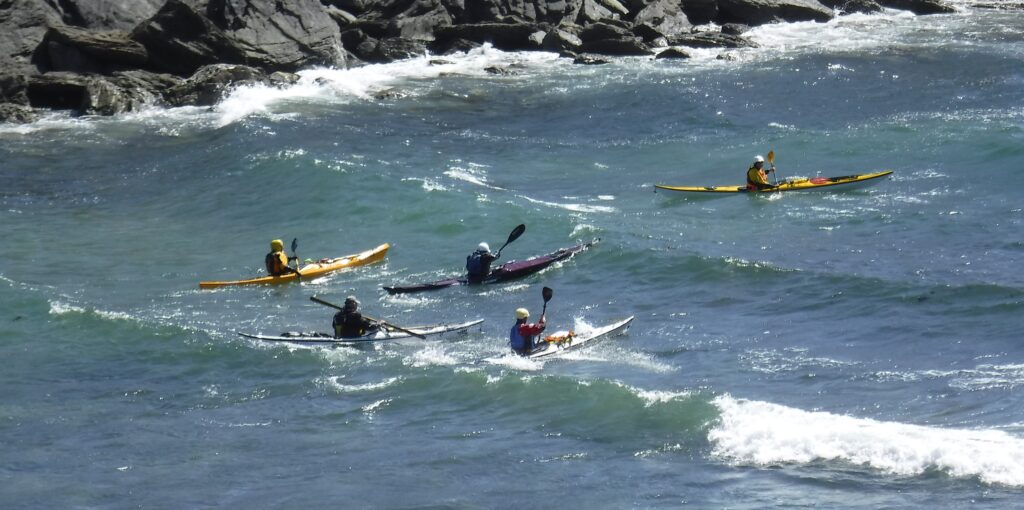
Assessments are a fantastic opportunity to showcase your readiness for leadership and you should relish this chance to demonstrate your capability and experience. However, there is a significant amount of preparation before the event. Let’s explore what you will need to do before, during and after the assessment.
Registration
The first thing you’ll need to do is register with your Home Nation before assessment. This process will verify that all necessary prerequisites are in place. These are:
- Full National Association Membership
- Valid (within 3 years) British Canoeing Awarding Body recognised 2-day First Aid Award
- Valid (within 3 years) Safeguarding Training recognised by British Canoeing Awarding Body
- Safety Award – Coastal Navigation and Tidal Planning or Open Water Navigation and Tidal Planning
Once you have received an email from your Home Nation confirming you have these recorded in your membership details you are then “good to go”. At this stage you can attend an assessment.
Venue and provider
Where will you choose to be assessed? This usually generates some debate – some will advise you to go for areas you know well, while others will suggest you pick unfamiliar waters. The decision may be influenced by your level of confidence and experience. Be aware that weather can also play a part in the story of your paddling life. You could find yourself beached if conditions are unsuitable for assessment, so be sure you’re prepared for this.
Who will assess you? There are assessors all over the world, so the choice is yours. However, be sure to check if they can assess for the qualification you wish to gain. Prices for assessments vary considerably and will often depend on the number of candidates. The “provider fee” element is fixed by British Canoeing. You can choose to be assessed by the same provider who delivers your leadership training if you wish – that’s within the rules. But for the highest level of satisfaction, choose an area that’s unfamiliar and an assessor you don’t know. If you pass under these circumstances then you’ll forever be sure you truly earned it.
Finding people to be led? You are expected to arrange your own “mock clients” for the day, and to take them on a journey that matches appropriate levels of challenge with the leadership award under assessment. It may be easier to find people to lead from your local paddling network. If you are struggling to find people, ask the assessor for help. Alternatively, book an assessment that is running as part of a symposium and you’ll probably have plenty of volunteers. Whatever you choose to do, make sure the “mock clients” genuinely need to be led. You don’t want superheroes – you need to be needed! You should be leading:
- Sea Kayak Award/3-Star/equivalent if you’re aspirant Sea Kayak Leader
- Coastal Sea Kayak Award/4-Star/equivalent if you’re aspirant Advanced Sea Kayak Leader
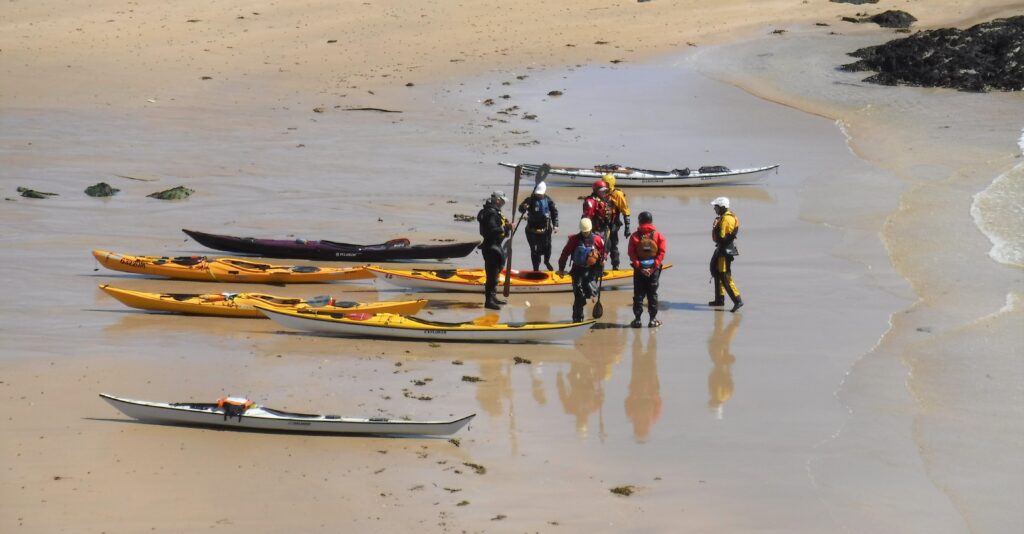
Learning – it never stops
Dedicate a good chunk of your time to preparation. Certainly don’t fall into the trap of thinking you can leave it to the last minute. You are studying for a professional leadership qualification that will prove you can be trusted with their lives, or the lives of people that matter to them. It’s a serious business and deserves your careful attention.
Become obsessive and diligent – learn all you can about effective leadership. Allocate sufficient time for appropriate e-Learning and explore the resources in the Digital Library. You’ll find a wealth of support here.
Be fully competent in the use of charts, maps, compass and every item of equipment you carry. Be able to identify and understand the meaning of sound signals and relevant navigational aids in real-life situations. Practice your ability to estimate speed, time and distance. Learn techniques for estimating wind speeds and wave heights. Understand what COLREGS are and how they relate to sea kayaks.
Read all the information available on the British Canoeing Awarding Body website relating to your particular qualification, including the Provider Notes. All this information is there to support your development. It’s going to help you anticipate and succeed throughout the assessment process. Go along on someone else’s assessment as a “mock client”. This is a great way of finding out what to expect when you are in the spotlight. Be sure to disclose your motivation to the assessor. You may pick up some useful tips if they are feeling generous. Remember this is not your assessment so resist any temptation to show off. Only do as you are asked – you could be next!
Planning and preparation
Your assessor will designate a general area for assessment (for example, within one hours’ drive of Plymouth) but the exact trip will be your responsibility to plan and execute. Have a number of different plans on the shelf so you can work with the predicted conditions. Become familiar with the area and check everything you can – road closures, holiday traffic, toilet closures, firing range activities, beach closures, local festival dates, car park closures – did I mention cafe closures? Scour maps, charts, Google Earth for useful information. Visit as many launch sites as you can and check out notice boards, parking charges and access restrictions.
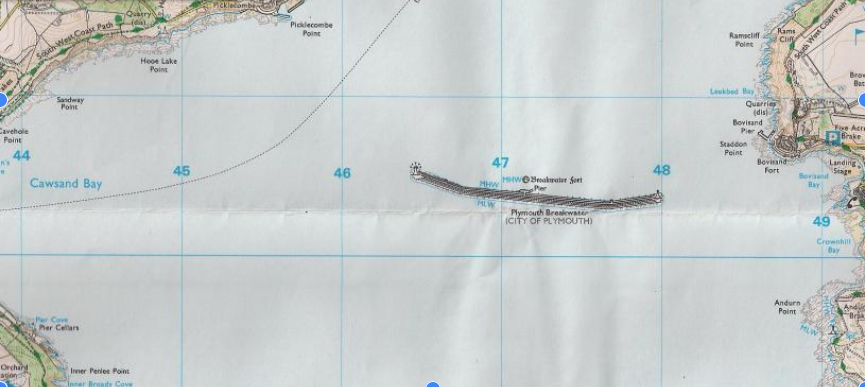
Be crystal-clear about VHF channels, coastguard stations, VTS, restricted areas. Leave nothing to chance and paddle your planned trips in advance if possible. Remember it’s up to you to communicate with everyone in the group, especially if you decide to adapt your plan to changing situations. Ensure you have valid contact details for each person, including the assessor.
For Advanced Water candidates, you must prove your capability to lead effectively in darkness. Plan your trip with start and finish times taken into consideration. Have everything you will need for paddling in the dark, and make sure your “mock clients” are suitably equipped too. Plan for meals, clothing and equipment changes. If you haven’t paddled in the dark for a while, find some friends and do it a few times.
Logbook
There is no formal requirement to keep a logbook but why wouldn’t you? It’s also a great learning tool, and looking back on previous sea kayaking trips can yield a wealth of understanding. You’ll have a historical record of weather and tide conditions you have successfully paddled in. Just remember to record the cancelled or aborted trip and say why. If not, you will forget.
A logbook can aid future trip planning, as you have access to hard facts about the nature of a coastline and what it felt like to paddle there on that day, with those conditions. It’s also often entertaining to look back over the adventures, re-living both the highs and the lows. You can record small details about discrete campsites that can be very useful and it’s something nice to share with those you trust to keep them secret.
From the point of view of an assessor, it allows us to get a sense of the mix of paddling experiences you already have. Sharing your logbook early in the assessment process can be really helpful.
Stay in contact with your assessor
Assessors really want you to pass and will do what all they can to support you. So agree a communication protocol, stay in contact and if you have questions or doubts, ask for help. Be aware that although they cannot do your work for you, they may be able to guide you towards the right course of action. You will need to complete a number of tasks prior to the practical aspect of the assessment – deadlines for these will be agreed with you. Don’t expect to be chased if you don’t submit your work. Avoid leaving things to the last minute – most assessors have other demands on their time and although you may be the most important person in your life, it’s unlikely they’ll be impressed if you expect them to jump around just because you’ve failed to get yourself organised.
On assessment day
Behave in a professional manner at all times. Embrace all the feedback you are given and resolve to be even better in the future.
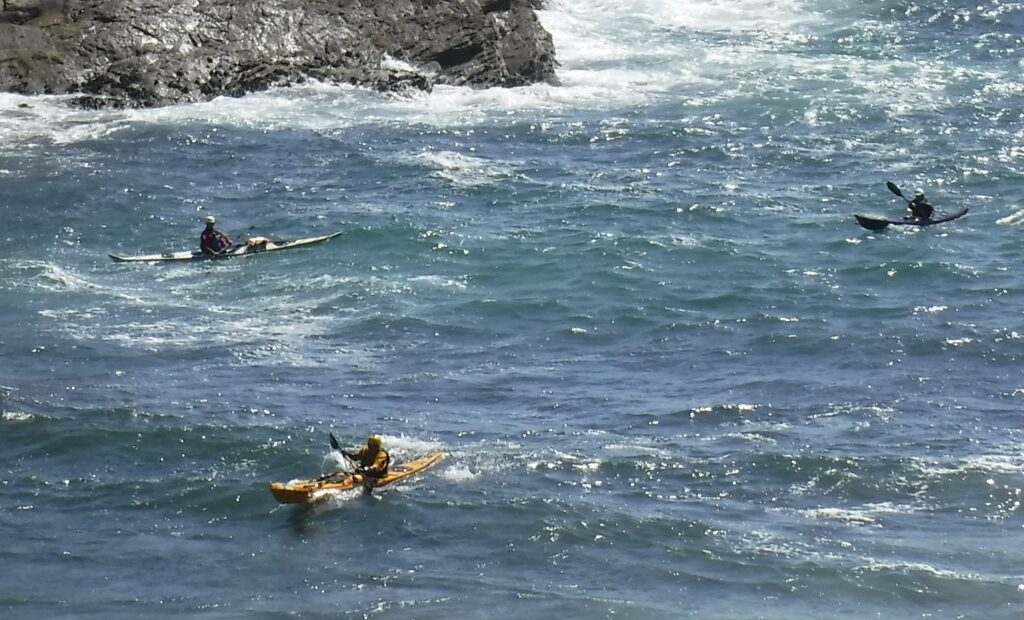
How to book?
To book a training course click the contact button and I’ll get back to you as soon as I can.
